
Dr. Mehmood Ul Hassan Khan has specialties in management, marketing, economics and governance. He has also master degree in Development with specialization in Diplomacy and Public Relations. He has also a rich experience in research, peace and conflict resolution and defence issues. His research and comprehensive articles have already been published in China, Uzbekistan, Iran, Turkey, Azerbaijan, USA, South Korea, UAE and Kuwait too.
He has great experience in the socio-economic, geo-politics and geo-strategic issues of Central Asia, Caucasus and Middle East. He is a famous expert on CIS and Caucasus in Pakistan. Member Board of Experts: CGSS, Islamabad. Ambassador at large at IHRFW.
Kazakhstan is the “biggest” economy of the Central Asian Region which has also “plentiful” of natural resources. It celebrates 30 years of its independence in 2021. During these years it has successfully “transformed” its macro-economy which is now stable and sustainable with bright prospects.
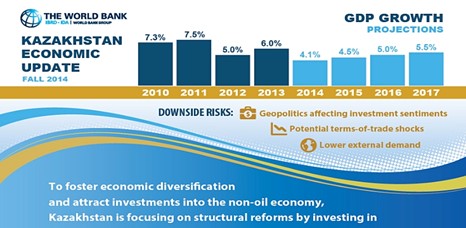
Diversified Macro-Economy
Due to numerous and constant structural reforms its national economy has been diversified up to optimal levels of productivity, innovation and renewables orientations. Its banking system is the biggest in terms of deposits, finances, operations and mortgaged assets in the whole region. Its financial system is resilient, restructured and remolded up to the requirements of global system and BASEL.
According to latest report of the World Bank (2019-2020) Kazakhstan has a GDP of above $180 billion. It is the largest economy in Central Asia, accounting for more than half of the region’s GDP.
Unemployment is low 4.9 percent in 2020. It joined the World Trade Organisation in 2015 which further strengthened its economic ties with the outer world.
Strategic vision of the government provides great opportunities for local entrepreneurs. The government plans to increase the number of people employed in SMEs to 4 million compared to 3.3 million in 2020, thus increasing the GDP share of SMEs to 35 percent by 2025 compared to 31 percent in 2020.
Constant structural reforms in economy, administration, business, trade and industries have transformed into biggest recipient of Foreign Direct Investments (FDIs) in the Central Asia. It was ranked 25th in the World Bank’s Doing Business Report 2019. It has attracted over $330 billion in the FDIs since 1991 which has increased 16-fold since independence.
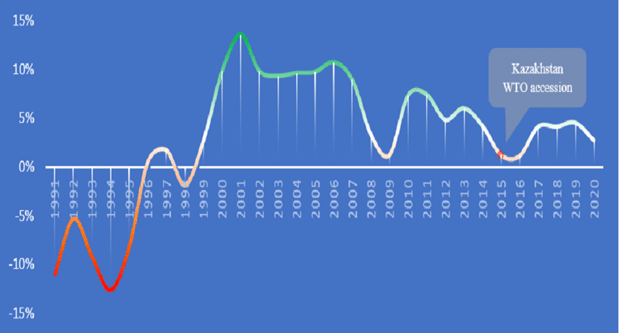
Now Kazakhstan accounts for approximately 70 percent of FDI into Central Asia. According to Kazakhstan statistical data (2020) around 50 percent of FDI in Kazakhstan has been attracted from the EU, including $96.6 billion from the Netherlands, $16.7 billion from France, $8.7 billion from Belgium, $6.8 billion from Italy and $5 billion from Germany.
Kazakhstan has been introducing comprehensive reforms in recent years to strengthen protection for investors, abolishing red tape, and transparent tax system and support domestic and international investors, businessmen and entrepreneurs. In this context, Kazakhstan was ranked 34th in the 2021 Index of Economic Freedom (in comparison with 59th in 2019) among 180 countries which is again highest among the CIS countries. The Astana International Financial Centre (AIFC) was established in 2018, aimed at making Nur-Sultan a financial hub in the region.
Stable & Accommodative Political System
It has stable, and accommodative political system in which opposition has stakes to participate in the decision making process of the government. On political front, parliamentary elections were held on 10 January 2021, to elect members of the Mazhilis and local representative bodies. The elections were the first since the implementation of new national guidelines designed to further increase the openness, fairness and transparency of Kazakhstan’s electoral system. 3 out of 5 political parties gained enough votes to win seats at the lower house of Parliament following the election.
In this regard, Kazakhstan president H.E. Kassym Jomart Tokayev has successfully institutionalized concepts of “Listening Stat” in the hierarchy of government’s vertical and horizontal presentations. In this connection, Kazakhstan was ranked 29th in the UN E-Government Survey 2020 among 193 countries (compared to 39th in 2019) the highest among CIS countries.
Constitution of Kazakhstan
According to the Constitution of Kazakhstan, it has a presidential form of governance. Executive power is shared by the government, while legislative power is exercised by Parliament consisting of the Senate and the Mazhilis.
President Kassym-Jomart Tokayev Strategic Vision & Blessings of Structural Reforms
Right from the beginning, President Kassym-Jomart Tokayev introduced various meaningful political, law, civil, and judicial reforms in the country aimed at modernising the political system and ensuring protection of human rights. It included, establishment of the National Council of Public Trust, an advisory body under the President to conduct open dialogue with representatives of the public, legal formalization of an institute of parliamentary opposition, 30 percent quota for women and young people to be included in political parties’ candidates lists, de-criminalization of libel, liberalization of peaceful assemblies and registration of political parties, lowering the threshold for political parties to enter Parliament from 7 percent to 5 percent, joining the Second Optional Protocol to the International Covenant on Civil and Political Rights, thus abolishing the death penalty and last but not least, strengthening the role of the Ombudsman for Human Rights which has now further strengthened its political stability and democratic norms in the country.
Dividends of Structural Reforms
It seems that substantial reduction of electoral threshold, relaxation in formation of political parties, paradigm shift from indirect elections to direct, further empowerment of women, free role of media, NGOs, civil society, and last but not least inclusion of very young people in the various elections has now further revolutionized the process of politicization and democratization in the country. In this context most recently held “Akim Elections” in rural areas of Kazakhstan through direct votes has consolidated true spirits of democracy in the society at the gross-root levels.
Futuristic Plans
It has strong political commitment having strategic vision to play a wider global role and widen its strategic partnership with South Asia especially with Pakistan which was among the first few states to recognize it in 1991.
It aims to become among the 30 most advanced countries in the world by mid-century, while shifting from a resource-intensive growth model to one that is cleaner, more innovative and more diversified. Reaching those goals will require further substantial reforms to improve public governance, to make the economy more open and competitive, to promote greener growth and to promote more equal access education, employment and economic opportunity.
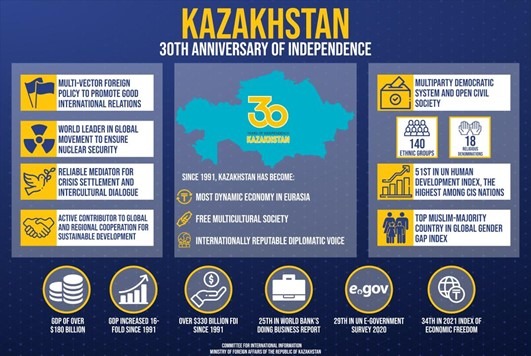
Implementation of Decentralization Doctrine
Right from the beginning, Kazakhstan initiated a series of reforms to introduce spirits of decentralization and a modern free market model to achieve the desire goal of socio-economic prosperity, massive industrialization and eradication of poverty and generation of new jobs. It successfully transformed the outlook of political canvas by changing its one-party government to a multi-party democratic system.
Kazakhstan’s Diplomatic Ties
Over the past 30 years Kazakhstan has established diplomatic relations with 186 countries and transformed into one of the dynamically economies of the region and world alike.
On the front of external relations, Kazakhstan has implemented a multi-layered foreign policy to establish good relations worldwide and is a world leader in the movement to ensure nuclear security.
Champion of Nuclear Security
On 29 August 1991, Kazakhstan closed the Semipalatinsk nuclear test site and gave up the fourth largest nuclear arsenal in the world. It contributed to the establishment of the Central Asian Nuclear Weapons Free Zone (CANWFZ) in 2009. A Low-Enriched Uranium Bank under the auspices of the International Atomic Energy Agency (IAEA) has been established on the territory of Kazakhstan.
Hub of diplomacy, conflict resolution & interfaith harmony
It has now become hub of diplomacy, conflict resolution, interfaith harmony and last but not least, multiculturalism. Kazakhstan plays a crucial role in enabling the ‘Belt and Road’ initiative. Kazakhstan accounts for 70 percent of transit traffic passing from China to Europe and vice versa.
Facilitating Role in P5+1 and Iran
It previously hosted two rounds of nuclear talks between the P5+1 and Iran. Kazakhstan convened the Conference on Interaction and Confidence Building Measures in Asia (CICA), which now consists of 27 member states. It is also a founding member of the Eurasian Economic Union which was established in 2014. It may also be recalled that Kazakhstan became the first Central Asian country to be elected as a non-permanent member of the United Nations Security Council for 2017-2018.
Productive Role in Regional & International Forums
Moreover, Kazakhstan is an active participant of regional projects being as a co-founder of the Shanghai Cooperation Organisation (SCO) and the Cooperation Council of Turkic-Speaking States (CCTS). It became the first post-Soviet and the first Muslim-majority country to chair the Organisation for Security and Cooperation in Europe (OSCE) in 2010, and hosted the first OSCE summit in eleven years, which adopted the Astana Commemorative Declaration towards a Security Community.
Kazakhstan successfully chaired the Organisation of Islamic Cooperation (OIC) in 2011-2012. Kazakhstan hosted the EXPO 2017 International Specialised Exhibition in Nur-Sultan with the theme of Future Energy.
Kazakhstan’s Conflict Resolution in Syrian Crisis
Kazakhstan has made a significant contribution to the settlement of the Syrian crisis through the Astana Process, which provided a platform for negotiations between the Syrian government, the armed opposition and the guarantor states Russia, Turkey and Iran. Contribution to rebuilding of Afghanistan is a major priority for Kazakhstan.
Kazakhstan’s rich ethnic diversity
Kazakhstan has rich ethnic diversity which is indeed core strength of its state and people alike. There are approximately 140 different ethnic groups and almost 4,000 religious organisations operating freely across the country representing 18 religious denominations. The key ideas of ethno-politics were devised during 1993 by former president, founder and father of the nation H.E. Nazarbayev. It was derived from Kazakhstan’s century’s old civilization, rich traditions, culture and customs based on the preservation of interethnic harmony, ethnic diversity, equality of citizens regardless of ethnic affiliation as well as instruction in proper patriotism.
It has been pioneer of interfaith harmony in the region and the world alike. It has been judged as the best tolerant country in the region by many regional as well as international organizations of humanities.
The largest ethnic group is Kazakhs 68.5 percent. Other ethnicities include: Russians 18.9 percent, Uzbeks 3.3 percent, Uighurs 1.5 percent, Ukrainians 1.4 percent, Germans 1.0 percent and Koreans 0.6 percent. Every three years, the capital Nur-Sultan hosts the Congress of Leaders of World & Traditional Religions to provide a forum for religious leaders to discuss the core issues facing the humanity and communities worldwide. The UN Human Development Index (2020) ranked Kazakhstan 51st in the (compared to 76th in 1999) the highest among CIS countries.
Pakistan-Kazakhstan Bilateral Relations
Diplomatic ties and brotherly relations between Pakistan and Kazakhstan have been exemplary since the establishment of formal diplomatic ties in 1991. Both the countries have been witnessing bilateral relations based on mutual respect, cooperation and economic integration.
Despite historic bounding and similarities of heritage and culture, persuasion of rigorous commercial diplomacy is the need of the hour. In this context, both countries have already prepared a “road map” aimed at further “diversifying” and “intensifying” the Pak-Kazakh bilateral economic cooperation.
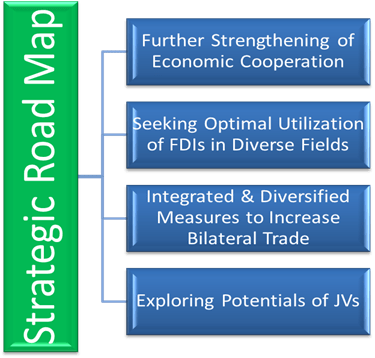
Brotherly Relations
Pakistan was among the first few countries which recognized Kazakhstan when it attained independence in December 1991. Subsequently, diplomatic relations/ties between the two countries were established in 1992. Pakistan took the initiative and the first Prime Ministerial visit took place in 1995 followed by second Prime Ministerial visit in 2011.
President of Pakistan visited Kazakhstan in 2011. Moreover, former Prime Minister of Pakistan Nawaz Sharif also visited Kazakhstan in 2015. Former Kazakhstan President Nazarbayev visited Pakistan twice in 1992 and 2003. Several Parliamentary and Ministerial as well as high level officials also exchanged visits.
Befitting Partnership
Kazakhstan supported Pakistan’s candidature to UNESCO Executive Board (2015-2019) and journey of mutual trust, harmony, political consultations and economic cooperation is getting momentum with the passing of each day.
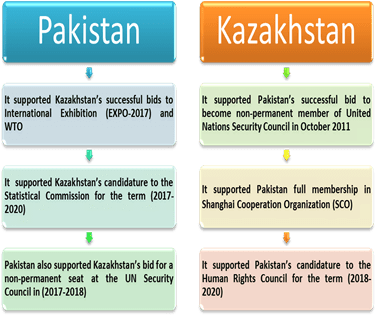
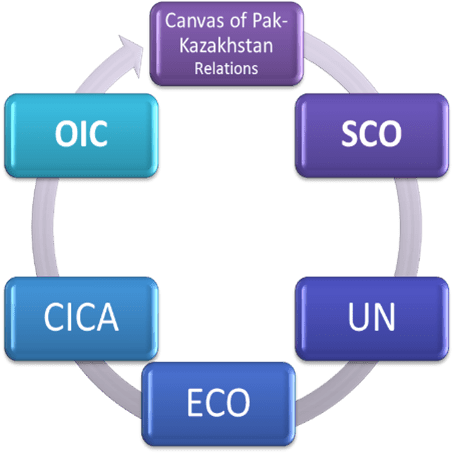
Enhancing of Bilateral Trade & Possible Means
Since Kazakhstan is the biggest land-lock country of the world having no direct road, rail, sea and air links with Pakistan so it is strongly recommended that both countries should focus on some “innovative plans” to enhance their levels of connectivity in the future. Strong political commitments and inclusion of respective private sectors may be useful to achieve the desired goals of socio-economic integration and greater regional connectivity.
Lack of direct connectivity seriously hamper bilateral economic and trade cooperation and coordination. But through serious initiatives the volumes of bilateral trade may be increased. Pakistan’s access to western China and Central Asia has been greatly expanded by the reconstruction and renovation of the strategically Karakoram Highway in the 2000s which may be utilized to enhance regional connectivity.
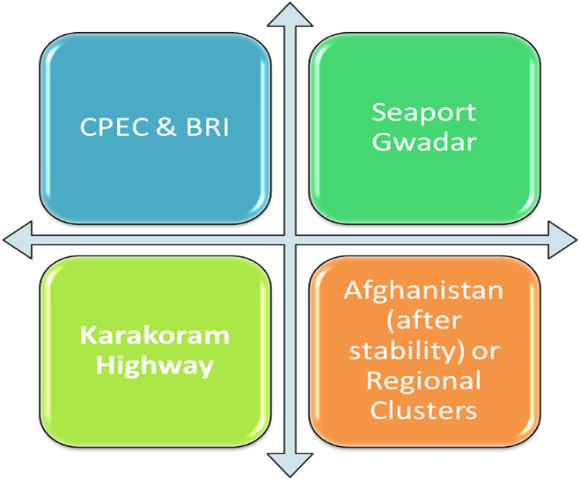
Preferential Sectors
It is suggested to extend mutual Cooperation in Textile, cotton products, pharmaceuticals, and food items, engineering equipment and machinery, and construction enterprises. In this connection, both countries must take initiatives to enhance trade and investments in textile and cotton products, pharmaceuticals, and food items, engineering equipment and machinery, and construction enterprises. Pakistan and Kazakhstan signed three memoranda of understanding (MOUS) for cooperation in the areas of trade and investment, defence and strategic studies, and training in foreign services which needs to be institutionalized as soon as possible.
Scheme of Arrangements
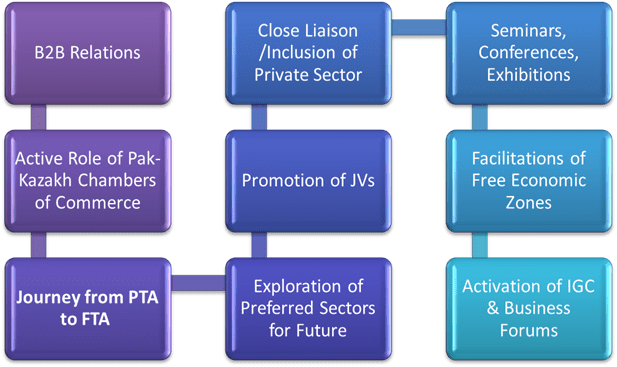
According to official statistics (2019-2020) the Pakistani exports to Kazakhstan largely comprise of precious stones and jewellery, textile, chemical and pharmaceutical products, agricultural and food goods, vegetables, shoes, leather items, sport and medical equipment, construction materials and etc. Pakistan imports from Kazakhstan construction and materials, food, machinery and equipment, fertilizers, coal, iron and nonferrous metals, seed oil and etc.
Pakistan has a huge consumer market and in order to take advantage of its vastness, Kazakhstan may export to Pakistan energy resources, electricity, mining and agricultural products, in particular wheat and meat. Similarly, Kazakhstan is importing in a large volume from Pakistan products of textile, cotton, leather industry, along with sanitary engineering equipment, medicaments and surgical instruments. Since we are living in an era of commercial diplomacy there is an urgent need to improve trade relationship through systematic awareness among the business circles of both the countries.
Even, Sialkot exporters may be ready to establish international standard “Pakistan Trade Centre” at Kazakhstan to boost ties. Being prominent regional expert of Kazakhstan I suggest that government of Kazakhstan may consider to allow/facilitate Pakistani exports to re-export their products from Kazakhstan to Central Asian States and Russian states. It may widen and brighten the scope of various joint ventures between the two countries in the days to come.
It is also suggested that there is a huge potential in banking & finance sectors which may be explored by both the countries. In this regard, ongoing closure of NBP branches in Kazakhstan may not be closed. The Astana International Financial Center (AIFC), stock exchanges of Pakistan and last but not least, the Trade Development Authority of Pakistan (TDAP) should cooperate to enhance diversified activities of business, investment, joint venture and financial integration in the days to come.
Similarly, cooperation may be extended in the sectors of tourism, air-links and hospitality between the both countries. They both must consider positively having trilateral agreement (Kazakhstan-Uzbekistan-Pakistan) because both the Central Asian Countries (CACs) have already signed a “joint Visa mechanism” for the promotion of tourism and hospitality sectors. Although, Islamabad and Astana (PIA & Astana Air) have already started research work to look into possibility of direct air link between the two countries however, the plan could not materialize because of flow passengers, on this route. To overcome this shortcoming, a trilateral agreement may be signed among (Kazakhstan-Uzbekistan-Pakistan) to start-up the direct flights through interconnected possibilities with Turkey & EU as final destinations.
Time and again the Kazakhstan has shown its keen interest to expand its ties in the fields of military cooperation, production, training, education and its associated sectors. In this regard, the Kazakhstan Ministry of Defence and Ministry of Defence and Aerospace Industry visited Karachi and attended the 10th IDEAS-2018. There are more than 38 representatives of the Armed Forces of Kazakhstan have already been trained since 2005 in military schools of Pakistan. Even during (2019-2020) four Kazakhstan officers got trained at the International Centre for Peace and Stability in Islamabad.
Kazakhstan is keen to take advantage from Pakistan’s vast expertise in combating terrorism. The first joint counter terrorist exercises “Dostarym-2017”, were held in November 2017 at the National Anti-Terrorist Centre of the Pakistan which further enhanced operational, strategic and tactical military cooperation between both the countries. The second counter terrorism exercises “Dostarym-2019” was held in 2019. It is suggested that both countries have to examine in a systematic way and pinpoint various untapped opportunities in the fields of military and defense cooperation and production in the days to come.
Bilateral cooperation forum like Pak-Kazakh Inter-Governmental Commission (IGC) may also be used to enhance volumes of trade & commerce between both the countries. Establishment of Islamic Organization for Food Security (IOFS) and other such forums may also be useful for further strengthening of bilateral relations. In the near past, the Trade Development Authority of Pakistan (TDAP) organized a large composite stall at the Trade Caravan in Almaty where 45 exhibitors of garments, sports goods, home textiles and other miscellaneous consumer product actively participated.
The Central Asia Regional Economic Cooperation (CAREC) Program is another vital strategic step of ten regional countries which was created in 1997 to promote economic cooperation in the region. The CAREC Corridor connects Pakistan to the Western markets of Europe and Russia, passing through Afghanistan, Tajikistan, Uzbekistan and Kazakhstan. The proper utilization of all these forums may provide a befitting proposition to all the countries.
A meaningful MoU was signed between National Export and Investment Agency “KAZNEX INVEST” JSC and Trade Development Authority of Pakistan (TDAP), to further enhance cooperation for arranging exhibition, exchanging business delegations and holding seminars on trade. A mix of Pakistani products may also be launched very soon in Kazakhstan where, TAPAL, Treet Blades and Vital Tea have already been launched.
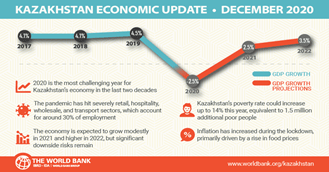
Recommendations
Being prominent regional expert of Kazakhstan & CIS I would like to submit my holistic recommendations as follow:-
- Special focus should be given to “preferential areas” such as trade, economy, energy, science and technology, education and more importantly land and air connectivity between Pakistan and Kazakhstan.
- Formation of a “special forum” for further strengthening of cooperation in diverse fields including regional connectivity, energy, security, education, culture, and people-to-people exchanges should be initiated as soon as possible.
- Rigorous persuasion of “public-private partnership (PPPs) for investments and business activities in both the countries would be game changer.
- B2B linkages between the private sectors of both countries needs to be pursued in good spirits which may untapped many area of bilateral cooperation.
- Formation of a group of regional experts (Pak-Kazakh) in the fields of media, research, publication, culture and investment (CGSS, Pakistan may play a paramount role in this regard).
- Joint ventures in the fields of energy, oil & gas, petro-chemical industries may be a “strategic step” in the right direction. These JVs may be jointly financed through banking channels of both the countries. In this connection, formation of “joint investment company” and “investment bank” may a workable idea which must be materialized in the days to come.
- There is a huge scope for further strengthening of bilateral relations in terms of “military cooperation”, “joint defense production”, joint training drills, education and aerospace industries etc. In this regard, KADEX and IDEAS platforms may be useful.
- There is an urgent need to expedite operations of Pakistan-Kazakhstan Intergovernmental Commission (IGC) on Trade, Economic, Scientific, Technological and Cultural Cooperation to boost economic cooperation that included trade and investment, transport and communications, agriculture, industry, energy, healthcare, environmental protection, information & broadcasting, civil aviation, tourism and training of diplomats.
- Formation & activation of “Joint Business Councils” in various sectors is the need of the hour.
- Pakistan-Kazakhstan “Diversification Forum” (Public-Private Partnership) to assist both the countries and private sector to achieve the optimal levels of diversification of resources and production channels in both the countries.
- Concept of “Cluster Trading” should be explored and implemented for achieving the desired goals of volumes of trade between the two countries. Expected peace deal in Afghanistan may widen the horizon of bilateral/trilateral trade activities.
- The Quadrilateral Agreement on Traffic in Transit may be a trade agreement between China, Pakistan, Afghanistan and Kazakhstan may also be useful in this regard. It connects Southern China and Pakistan to CARs.
- For greater regional connectivity the Central Asian Countries may accelerate the growth of the “Gwadar Seaport”.
- Pakistani products i.e. fruits and vegetables, pharmaceuticals, surgical instruments, leather goods have great potential in Kazakhstan and Pakistani exporters should step up efforts to enhance exports of these products to Kazakh market. Formation of Pakistan-Kazakhstan Trade Centres on reciprocal basis would a valuation addition.
- Railway link/logistic Kazakhstan-Turkmenistan to Iran which could be extended to Pakistan to promote bilateral trade and people to people contacts.

